James Gunn, for all the laudable qualities he’s brought to movies, TV, and the nascent DC Studios, can’t keep getting away with it. Specifically, through the first three pieces of his DCU, all written by Gunn, the writer/director/producer has skirted timely, topical real-world issues… Only to back off from them in favor of earnest homilies which break the world into simple good and evil. They’re straight out of comic books, and that’s likely the goal – but to use the same sort of profane language one of his characters might enjoy: James Gunn needs to s**t or get off the pot.
Spoilers past this point for Creature Commandos, Superman, and Peacemaker.
The latest instance is in this week’s episode of Peacemaker, “Like A Keith In The Night.” In Season 2 of the HBO Max series, the main character, played by John Cena, has moved to an alternate dimension Earth that he thinks is perfect. That’s thanks to him being treated as a hero, and his father, Auggie Smith (Robert Patrick), and Keith Smith (David Denman) both being alive, versus in the DCU. Not only that, they’re all on a superhero team called the Top Trio. Fun!
Unfortunately, the earnest, sort of dumb Peacemaker doesn’t notice one key aspect of this dimension: it’s Earth-X, where Hitler and Germany won World War II. That means people of color have all been sent to work camps, the swastika replaces the stars on the American flag, and there’s a copy of Mein Kampf on every desk. The whole thing is mostly played for laughs, including Peacemaker’s best friend Adebayo (Danielle Brooks) being chased by a mob of white folks through the neighborhood, Weapons-style, before they’re electrocuted by Judomaster (Nhut Le) in a swimming pool.
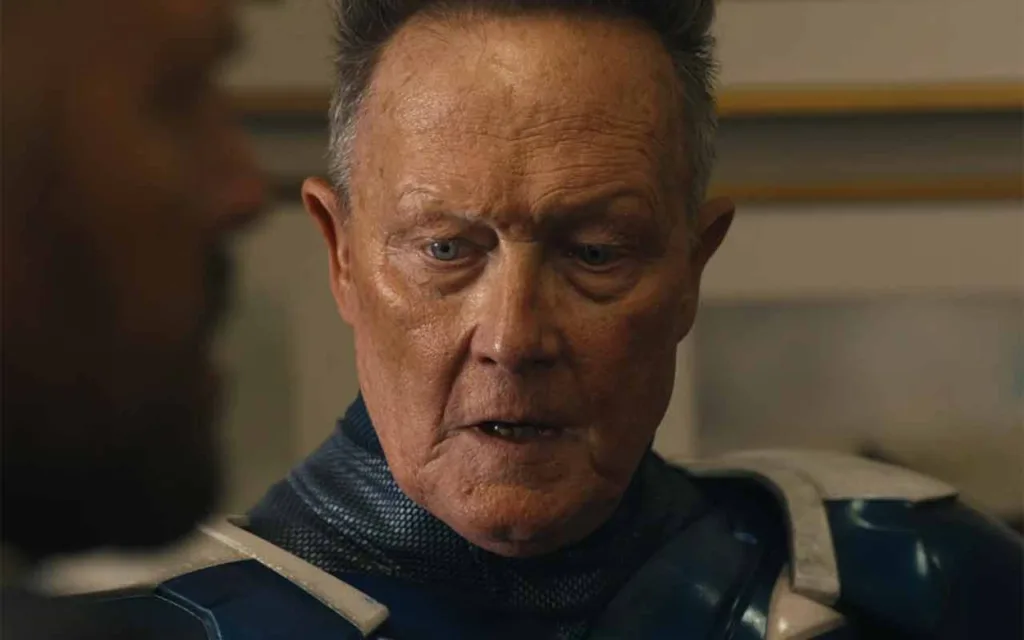
The kicker comes later in the episode, though. Peacemaker, Emilia Harcourt (Jennifer Holland), and John Economos (Steve Agee) are confronted by Auggie and Keith, who know that our Peacemaker accidentally killed his alternate universe double. Auggie and Keith have a tense discussion about it, with Auggie firmly deciding to let the whole group, including Adebayo, go back to the DCU and never return.
“Awfully generous for a Nazi,” says Harcourt.
A furious Auggie yells, “Don’t call me that!”
“Don’t call you a ‘Nazi’?” she asks incredulously.
“I didn’t create the problems in my world, missy,” Auggie says. “I don’t agree with them. I applaud you if your world is perfect and you fight every injustice you ever see. Is that what you do? Unfortunately, I haven’t got the strength for that. I fight the madmen, murderers, and monsters in front of me because that’s all I can control. And at the end of my life, when I stand in judgment before god, I hope that he knows that I did the best that I could, and I left this world a better place than when I came–”
At that point, Auggie is murdered by Vigilante (Freddie Stroma), and we don’t really get a finish to the monologue. But immediately following, a grief-stricken Peacemaker says, “He wasn’t a Nazi,” as the group all tries to escape back to their Earth.
Here’s the thing: Auggie of Earth-X may not have been a Nazi or subscribed to the Nazi ideology. But he was a prominent part of a superhero trio who lived a rich and mostly carefree life in a Nazi dimension. He was not in a work camp. He regularly saved people who would be considered Nazis in name as well as deed. And whether he was racist or not, without his efforts, if society had crumbled, or gone in a worse direction… Well, he was actively making this Nazi society better merely by existing in it.
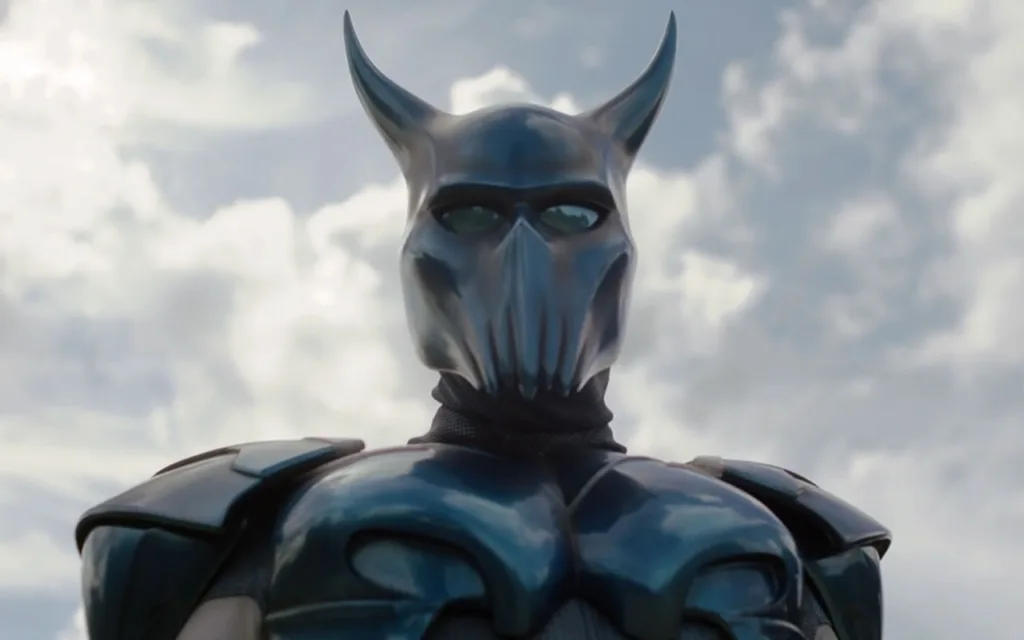
There’s a term that is used for Germans who lived in Germany during World War II, under the reign of Hitler, ones who didn’t subscribe to the Nazi philosophy but also did not resist in any significant way. Those people are called “Good Germans.” And that isn’t an honorific, it’s dismissive and sarcastic, to put it politely. There’s another term that takes it a step further: “Collaborators.” While Auggie here claims to be just doing what he can in society, he’s clearly not just a cog in the wheel; he’s actually profiting from it, as we can see from his whiskey nights with his sons, not to mention their well-maintained superhero armor. They could have used their superhero armor to fly over to a work camp and free the prisoners, but did not. Keith, at the very least, is seen killing the Sons of Liberty, members of the resistance. Whatever Auggie thinks he is, applying real-world logic to it, he is not. He may not be a Nazi in name, but anyone who does not actively resist Nazis is the next worst thing.
While we do have one more episode to go in the season, at least based on this, so far, the text is what it is. It’s about Peacemaker’s emotional journey, and leading him to a place where he thinks his alt-Dad wasn’t such a bad guy, and had to watch him die, yet again (last season he killed his actively white supremacist dad). The impression we, the viewers, are supposed to take away is sympathy for Auggie. He’s “one of the good ones.”
Gunn isn’t wrong to hook the show Peacemaker on the emotional journey of the character Peacemaker. It’s the titular role! But even beyond the whole Nazi of it all, this is becoming part of a pattern with his DCU work that is confusing at best, and alarming at worst, an attempt to skirt the surface of societal issues without ever fully saying anything definitive about them.
To take it back to the first part of the DCU, Creature Commandos, the season started with a strong, timely premise: the sorceress Circe (Anya Chalotra) was leading a group called the Sons of Themyscira (using the acronym SofT), a men’s rights organization that believed they should be allowed to visit the all-female island Wonder Woman hails from. Through this, Gunn had some sharp dialogue that echoed real-life organizations like the Proud Boys, and it seemed like this thematic idea would carry the season.
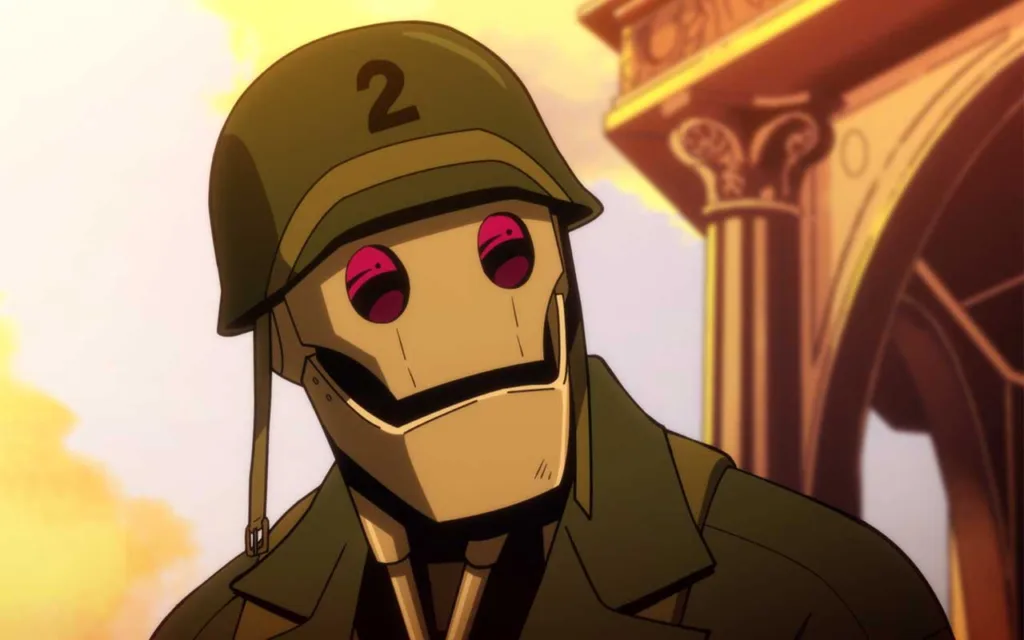
It did not. Instead, Circe and the Sons were shunted to the side for the most part halfway through the season in favor of a more generic “who are the real monsters” premise (spoiler: it wasn’t the monsters). It backed off the timelier, world outside your window idea to instead focus on one of Gunn’s favorite themes, found family. In the middle, we did meet the character of GI Robot (Sean Gunn), who was created during World War II and loved killing Nazis, eventually doing the same to a kindly man voiced by Michael Rooker when he turned out to be part of a white supremacist organization.
Look, Gunn is at least very clear that Nazis/white supremacists equal “bad.” And perhaps that straightforward simplicity is necessary in a world where those who call themselves fans seriously ask questions like “when did Star Trek get woke?” (The answer is 1965, when the first episode aired, and every subsequent episode since then). But an unwillingness to engage the subject matter beyond childlike views of right and wrong gets muddied when you’re working with more current depictions of evil, like MRA (Men’s Rights Activists).
This sort of hiccup in political theming would have been fine on its own, but then there came Superman. A lot of ink has already been spilled about how the movie muddies the waters of its conflict between Boravia and Jarhanpur, seeming like it might be about the conflict between Israel and Palestine, but jumbling the details enough to make it unclear. That was perhaps by design, as discussing the current conflict is akin to throwing an electrical wire in a swimming pool. But in an interview with Variety, Gunn explained that it wasn’t about that at all.
“Absolutely 100% of that movie was written and done before anything ever happened between Israel and Palestine, and everyone continues to refuse to believe that that’s not what it’s about,” Gunn said. “It’s not. It just isn’t. You can take whatever you want from that, to mean what you want, but I didn’t write it to be a stand in for Israel and Palestine.”
While one could point out that regardless of what’s happened post October 7, 2023, the conflict between Israel and Palestine has been pretty openly existing and occurring for decades… Once you accept that wasn’t what Gunn was writing about, the question becomes: what is Superman about? In the same interview, while Gunn noted that he is aware there’s been “more racism lately” and that’s “f**king discouraging,” both Peacemaker and Superman aren’t focused in that direction.
“That isn’t what I write the show for,” Gunn continued. “I write the show for the emotional angle, just like I wrote Superman to be about kindness. If there was a sociopolitical aspect of Superman, it’s that there has been an absence of kindness and understanding and loving a human being, no matter what their thoughts or feelings are.”

That’s all well and good, but then why is he including the other aspects? Why nod towards global conflicts in Middle Eastern countries, MRAs, and the rise of fascism if that’s not where you focus lies? And more importantly if you don’t have anything more to say about it as a filmmaker than “generally I don’t like this, now here’s some jokes about Pokémon.” As the head of DC Studios, Gunn is the guy in charge. Of course there’s oversight, and other people reading his scripts; but he’s the one who is choosing to tackling current issues. If he doesn’t want to do that, perhaps don’t make the choice to do so.
Perhaps Gunn is just earnestly naive about this sort of thing. In this week’s episode of the Peacemaker: The Official Podcast, Gunn discussed running the scripts by Brooks before going forward with the Nazi Earth storyline, and then discussed some of his upbringing.
“Where I grew up in St. Louis, Missouri, is an incredibly segregated place,” Gunn recalled. “And there are Black people there, but it’s… White people, Black people live primarily in different places. And when I grew up there was like… I always thought there’s Black people, there’s White people, and then everybody else is White. Mexicans are White. I never once in my entire, until I was, like, pretty old, like embarrassingly old, I never thought of a Latino or a Latina as a person of color. Just that they were White!”
He goes on to explain that he does understand different ethnicities now, but the key sentence here is noting that he was “embarrassingly old” when he started to realize this. I certainly can’t personally speak further to Gunn’s upbringing or mental state, but it does point to an overall simplistic view of the world, perhaps exacerbated by growing up in a homogenous area.
But there’s another school of thought that could argue a smart guy like Gunn knows exactly what he’s doing. While he’s talked a lot about how Warner Bros. Discovery, the parent company of DC Studios, has been relatively hands-off and encouraging of his work, it’s impossible to imagine he’s completely isolated from the greater machine as co-CEO of DC Studios. There’s still a business to think of, and backing off from any overt political statements or passing them off as something else is a relatively easy way of attempting to avoid controversy.
And Gunn is someone who knows first-hand from controversy, having been fired by Disney from Guardians of the Galaxy, Vol. 3, due to resurfaced Tweets, amplified by right-wing provocateurs with the express purpose of getting him fired from the MCU (Marvel Cinematic Universe) film. Disney did rehire him, after he had already signed with Warner Bros. to write and direct The Suicide Squad, and the rest is history. But it is impossible to believe that such an enormous experience didn’t change Gunn in some way. In fact, he discussed this on a previous episode of the Peacemaker podcast, noting that he was hitting a wall after Guardians of the Galaxy Vol. 2. And due to the time off from the firing, had a journey of the soul/creative realignment that found him coming back looser in terms of camera work, but – and I’m extrapolating on this latter point – more buttoned up in terms of political leanings and off-screen humor.
Nowhere does this come out more clearly than with Superman’s array of rage-tweeting social media monkeys. In the movie, we discover that the trending topics that are slamming Superman (David Corenswet) are not organically posted; they’re a group of genetically altered monkeys Lex Luthor (Nicholas Hoult) is using for the purpose of levying public opinion against the Man of Steel. So is this about Gunn’s travails during Guardians 3?
“I don’t think so,” Gunn said when The Times asked him directly about it. “It’s not really about me, but people in general driven by rage or the bots governments pay for that create all sorts of nonsense.”
This is, once again, either a severe lack of self-understanding or Gunn not being completely above board. How can a man who was fired from his job due to a bad-faith right-wing troll campaign and had a life-changing realization as a result not be writing about the exact thing that happened to him, in a movie that he wrote and directed?
To take this a step further, while a character’s words should never be taken as the writer’s thoughts themselves, it’s hard not to look at Superman’s whole plotline in that movie as anything but an analogue for Gunn himself. Superman has a standout scene early on, frustrated at Lois Lane (Rachel Brosnahan) who is aiming to quiz him about his decision to stop Boravia from invading Jaranphur. “People were going to die!” Superman yells in the climax of the scene as an explanation for his actions. And towards the end of the movie, Superman tells Lex, “I am as human as anyone. I love, I-I get scared. I wake up every morning, and despite not knowing what to do, I put one foot in front of the other, and I try to make the best choices that I can. I screw up all the time, but that is being human, and that’s my greatest strength. And someday, I hope, for the sake of the world, you understand that it’s yours too.”
While it might be as simple as Gunn recycling ideas, it’s hard not to see the parallels in Superman’s speech and Auggie’s. They’re both about someone who considers themselves a good man trying to their best in an unjust world. Perhaps that is how Gunn sees himself, in the midst of the gigantic corporation that is Warner Bros. Discovery… He’s sneaking in political ideas in the guise of superhero popcorn, and passing them off as anything but.
That’s all speculation, though. And I only bring all this up about Gunn to perhaps point to why he is injecting surface-level political ideas into three out of three DCU properties so far, while consistently denying they have any real-world parallels. He doesn’t have to tackle current issues if he doesn’t want to; he’s making a choice. So why is he making that choice halfway, and demurely explaining it’s just about “being good” when it seems to be about so much more?
The bigger problem is, it’s not enough to say “be good to each other” and leave it at that when ICE is regularly rounding up people off the street and shipping them to foreign countries, possibly never to see their families again. Kindness is important, but that doesn’t help trans kids who will die without access to health care. When the American president is ordering the army to invade American cities and use them as training grounds, we’ve passed the point of understanding other people’s point of view on how they’re one of the good ones, and are just in the midst of hard cicrumstances. Decisions are difficult for everyone, but you do not, at any point, have to hear fascists out.
If James Gunn wants to deliver popcorn movies where good guys are good and bad guys are bad, that’s fine and is his choice. But by lightly poking the surface of more hot-button issues while backing off that hot stove, he’s not getting burned… But he’s also refusing to let these ideas heat further than a light simmer.
Superhero fiction, since its inception, has been political. Superman was introduced as a man who took on billionaires, landlords and fought for the common man. Peacemaker is an exaggeration of America’s “peace at any cost” mentality. It’s part and parcel with the genre, so despite the fractious nature of how politics in superhero fiction is currently treated by trolls online, it’s nothing new. And one of the strengths of fiction as a whole has always been that level of metaphor: it can reflect our world outside, and illuminate more about the state we’re currently experiencing.
But it’s not enough to gaze at the world outside your window and say, “Hey, look at that.” Gesturing towards what’s happening isn’t enough. You must look out that window, stare hard, and then venture beyond that pane of glass, pushing viewers through it if you have to. And right now, James Gunn is merely gesturing, when the time for subtle gestures passed long ago.
Peacemaker Season 2 Premiere Dates And Episode Guide:
Peacemaker season 2 premiered on HBO Max on Thursday, August 21. The season will be eight episodes long, with one episode premiering per week.
Here’s the full list of episodes in Peacemaker Season 2, with premiere dates:
- Thursday, August 21, 2025: Peacemaker, Season 2, Episode 1
- Thursday, August 28, 2025: Peacemaker, Season 2, Episode 2
- Thursday, September 4, 2025: Peacemaker, Season 2, Episode 3
- Thursday, September 11, 2025: Peacemaker, Season 2, Episode 4
- Thursday, September 18, 2025: Peacemaker, Season 2, Episode 5
- Thursday, September 25, 2025: Peacemaker, Season 2, Episode 6
- Thursday, October 2, 2025: Peacemaker, Season 2, Episode 7
- Thursday, October 9, 2025: Peacemaker, Season 2, Episode 8 *Season Finale*
Where To Watch Peacemaker:
Listen to Sons Of A Gunn:
Discover more from Comic Book Club
Subscribe to get the latest posts sent to your email.
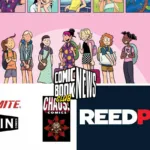


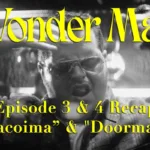

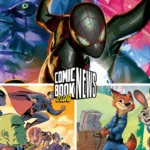
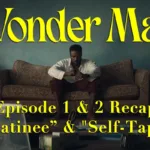
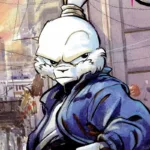

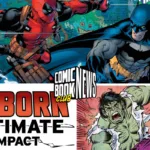
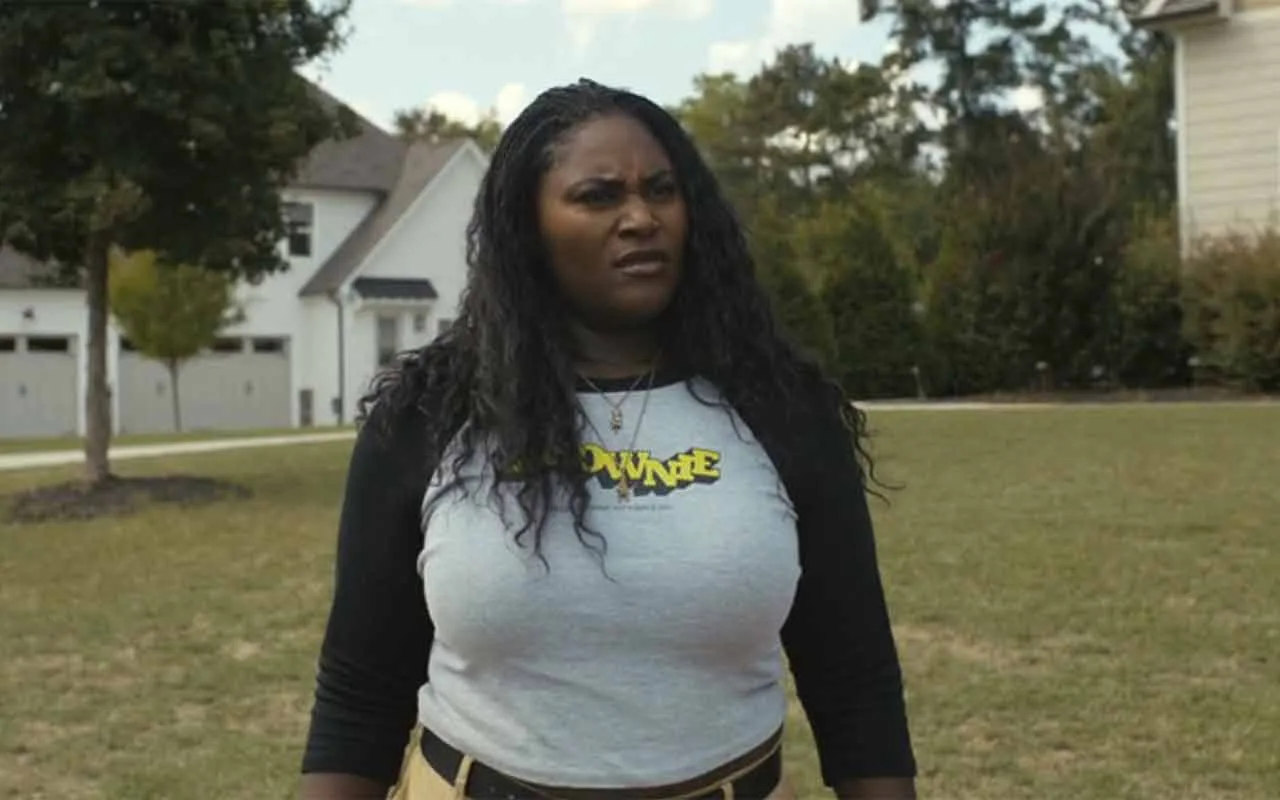

Great writeup! I’m enjoying the DCU so far, but there are some flaws that are noticeable already. I wonder if Gunn was stretched thin writing Superman/CC/Peacemaker S2 all at once, because while the DCU has been fun it has been kind of messy. I do wish Gunn would decide if he wants to just do popcorn movie good guys vs. bad guys or really get into these broader, pressing topics.
Both Peacemaker S2 and Creature Commandos would have been a lot better if they had committed to the stuff they set up that echoed current events, the Nazi universe wrapping up the way it did in ep 7 (well it could still pop up in the finale but that felt like we were through the bulk of it) feels unsatisfying, and in CC having the MRA types as the threat the whole time would have fixed some of the big issues with the present day story which felt pretty convoluted by the end, more interested in going from tragic backstory to tragic backstory to the big tragic finale moment rather than like focusing on an ongoing plotline.
Totally agree, and thank you so much for reading (and commenting)! I’m generally enjoying everything DCU, but it feels like it keeps approaching things, then backing away – hence this piece. Fingers crossed they land the plane in the Peacemaker finale, though.
It really sounds like you want problems and controversy and for Gunn to get in trouble. Just sit down and watch the fucking shows jesus christ.
Well thought out article. Haven’t seen S2, don’t have HBO, but sounds like Gunn 100%. I wouldn’t give him to much grief after being bitten once. Hopefully the ethos he is trying to bring home will become deeper. Honestly anyone trying to bring to film anything in the middle east is going to be polarizing, and inflame a ton of ignorant people
James already fucking said it. He touches on things but he is not doing an overtly political dcu. Thanks fucki g God. There’s enough of that shit in the news cycle. Quit whining and enjoy the shit before we’re all dead in ww3.
Can we just be entertained? Does every show have to be political? Everyone has their own views on the world at large and a TV show is not going to change anyone’s mind … if they are a terrible person because peace maker said be good is not going to change someone . Sometimes we need to get away from issues and just be entertained…. this is just one Joe’s opinion.
Can we stop pretending that ICE doing their jobs and removing those actively breaking the law is a problem?
Well, it’s because he’s not doing anything the source material hasn’t already done. He’s adapting comics, these are all things that have happened in the comics. Do you think the CW Arrow Earth X stuff should have been more political. This is mainline DC not V for Vendetta or Watchmen. It’s supposed to be fun and light, and he’s just pulling from things that have already been done with his own spin.if you want scathing political commentary you can find it elsewhere. We don’t need it here. And if you feel the need to speak out on the atrocities go do it yourself, don’t wait for entertainment to do it for. Don’t be the good man that does nothing.
STFU and just let the man write entertainment for entertainment sake, everything doesn’t have to be a message, James gun doesn’t have to try and save the world, fantasy hero comic series aren’t going to save the world, we watch these shows not to be some anyone’s agenda but to be entertained and possibly vacation from this crazy world we live in, so trying to be sjws and just let yourself and everyone else just enjoy a fantasy fun tv show for what it is, JUST A FUN FANTASTICAL TV SITE AND NOT SOME WORLD CHANGING AGENDA EVENT
It’s a tv show ,it’s not that serious
This is a really great article. Thank you for articulating something I’ve been trying to work out since Superman. Like you, I wasn’t sure if Gunn was deliberately vague about the Israel/Palestine parallels in Superman or was being careful not to ignite the rage of those on the right or those who don’t want “politics” with their cereal in the morning. I assumed it was the latter, especially because Sean Gunn triggered them all before the film came out with his comments about immigrants.
But having watched this latest ep of Peacemaker, I think it’s more that Gunn just doesn’t have the depth to tackle these issues. Like you say, he’d rather gesture at them and give us perceived meaning, but he backs away. I’ve been struggling for a long time with Harcourt as a character for example, because quite frankly, she’s written like a man with boobs. He just doesn’t understand how women generally process anger, or engage with physical violence. Likewise, despite whatever conversation Gunn might have had with Danielle Brooks, the man has no idea what it would feel like as a black or brown person to suddenly have people chasing you like that. Adebayo got over it VERY quickly, and there wasn’t any meaningful dialogue about what that would FEEL like. The fear, the unsettled feeling, the panic. She played Scrobble or whatever, and moved on from it. And Peacemaker himself, didn’t have a moment where he felt that fear or panic for his best friend. It was disappointing how they all reacted so nonchalantly to finding themselves in a Nazi-run world.
There is a way of creating fun, comedic, comic book shows and films without losing those human elements. I use the word human, because the word political seems to upset. The most celebrated ensemble group of heroes, the X-Men, are in their very existence political. So it can be done.
Thank YOU for reading, and your thoughtful comments! Totally agree with everything you said, and appreciate you putting them here.